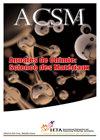黄钾铁矾的研究进展及利用潜力
IF 1.1
Q4 MATERIALS SCIENCE, MULTIDISCIPLINARY
引用次数: 26
摘要
黄钾铁矾是一种有效的金属清除剂,化学式为AFe3(SO4)2(OH)6。本文对黄钾铁矾的形成、分解和利用进行了综述。目前已有研究表明,生物黄钾铁矾种子在黄钾铁矾沉淀过程中可以缩短诱导期,降低温度限制。生物黄钾铁矾种子沉淀黄钾铁矾过程更完整。Fe2(SO4)3的浓度、搅拌速度、pH和温度等结晶参数对黄钾铁矾的形貌和粒度有显著影响。采用热和水热两种不同的方法对黄钾铁矾进行分解。黄钾铁矾种子是一种潜在的资源,必须以技术上可行和环境友好的方式进行回收。此外,黄钾铁矾在湿法冶金、锌工业、除砷等杂质、颜料、纳米粒子、填充材料、吸附材料、酸性试剂、催化材料等方面具有控制铁的优势。本文章由计算机程序翻译,如有差异,请以英文原文为准。
A Review on Various Aspects of Jarosite and Its Utilization Potentials
Received: 15 November 2019 Accepted: 28 January 2020 Jarosite is an effective scavenger for metals by the chemical formula AFe3(SO4)2(OH)6. In the present article, a comprehensive literature review is performed on the formation, decomposition, and utilization of jarosite. Based on reviewed studies, biological jarosite seeds can shorten the induction period and reduce the temperature limit in the jarosite precipitation. Also, the precipitation process of jarosite is more complete with biological jarosite seeds. The crystallization parameters such as Fe2(SO4)3 concentration, agitation speed, pH and temperature have significantly affected on the morphology and the particles size of jarosite. Decomposition of jarosite is carried out using two different methods thermal and hydrothermal. Jarosite seed is a potential resource, which has to be recycled in a technically feasible and environmentally friendly manner. Besides, it is observed that jarosites have several advantages such as control iron in hydrometallurgy, zinc industry, arsenic removal and other impurities, pigment, nanoparticles, filling materials, adsorption materials, acidic reagent, and catalytic materials.
求助全文
通过发布文献求助,成功后即可免费获取论文全文。
去求助
来源期刊

Annales De Chimie-science Des Materiaux
工程技术-材料科学:综合
CiteScore
1.70
自引率
25.00%
发文量
33
审稿时长
>12 weeks
期刊介绍:
The ACSM is concerning the cutting-edge innovations in solid material science. The journal covers a broad spectrum of scientific fields, ranging all the way from metallurgy, semiconductors, solid mineral compounds, organic macromolecular compounds to composite materials. The editorial board encourages the submission of original papers that deal with all aspects of material science, including but not limited to synthesis and processing, property characterization, reactivity and reaction kinetics, evolution in service, and recycling. The papers should provide new insights into solid materials and make a significant original contribution to knowledge.
 求助内容:
求助内容: 应助结果提醒方式:
应助结果提醒方式:


